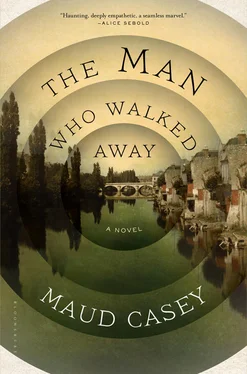Albert’s father said nothing when he came inside. He had lost his wife, his boy had lost his mother, and now they were the man with the disfigured face and his son, already odd, now odd and shamed. What was there to say? There was only protecting his son, getting through the days as best he could. “Go to bed,” he told Albert as gently as he knew how; only Albert understood that the sternness in his voice was a form of tenderness.
“Go to bed, he told me.” There is such a great distance between the dream and the meager words he can shape out of that dream to offer the Doctor. “He was not angry, though he sounded stern.”
He wanted to keep you safe. We want to keep you safe.
“Yes, he always wanted to keep me safe. He only wanted to keep me safe.”
Albert, this is very useful. There is no need to cry. This is enough for today. We will do this again tomorrow.
He is glad. He is. These memories are beads strung on a fragile thread that has lasted from then until now. At last, he is here, he is here, he is here. I am so glad. He is that I. He is an I that has lasted from then until now.
The Doctor blows on Albert’s eyelids.
“My life was not always without love,” Albert says, opening his eyes. What he means is, Here is love .
And here : green leaves of the Spanish chestnut trees in the public garden sparkling gold, illuminated by the gas lamps his father installed in the park. Come climb , they said to thirteen-year-old Albert, restless in the days before his mother died; so restless he walked over to the cathedral to look up at its soaring arches and buttresses. Looking up at them caused a fire in his chest that felt like the kind of strength that might save a dying mother.
“Tell me about the rats again,” he would say to her, because he knew the rats secretly gave his mother pleasure. Sometimes, if he was very lucky, she would describe how much she detested those rats in the public garden, nesting in the soft ground under the Spanish chestnut trees, scrambling and screeching over every fallen chestnut. That rodents had overrun the fancy trees planted by the city at great expense delighted her, a woman who took in knitting for extra money. “We are not a family getting fat off the triangular trade,” she would remind Albert whenever he asked for things.
But there were those leaves sparkling gold behind his eyelids. Why couldn’t he stop himself? When his mother, so sick in her bed, said, “Don’t,” why did he hear: Why not?
There are some things he cannot tell the Doctor. He doesn’t have the words.
Those leaves sparkled gold: an invitation. Come climb.
The chestnuts rained down from the spindly branches of the tree. They rained down onto the filthy rats as he climbed, sending them scrambling, but they rushed right back to fight over the soft meat of the nuts. Then he was out on a sturdier branch, clinging to it, and the view was as grand as the one his father once showed him from the top of the Pey-Berland Tower. All of it laid out before him: the slated rooftops of the city, the church steeples, the flickering lights of hundreds of gas lamps illuminating the giant clock of St. Eloi, the ancient gate, the ancient amphitheater where the gladiators once fought.
He clung to the branch as it grew dark, staring into the sky without end, and his life seemed so small. How could it be that his small life could deserve so much love? There was so much love, but since his mother’s illness the love was so fragile. In the tree, his body pulsed with that fragile love. He opened his mouth and the fragile love grew strong. He imagined it shooting like flames out over the city, over the countryside, to places he’d never been before. It was so exhausting, this love, and he fell asleep; he dreamed he was a glittering leaf blown by the wind off the branch, tossed and twirled, floating up and up and up. In his dream, he never fell.
When he hit the ground, the filthy rats did not bite him as his mother had feared; they must have run away. Or so he thought. He couldn’t be sure. When he woke, he discovered himself sometime later, not knowing how he got there, on a bench somewhere else in the city with chestnut-sized bruises down one side of his body. The bruises lingered after his mother’s death; he had wanted them to stay forever, a remnant of the time before, but each night the bruises turned a different, lighter color, black then blue then green then yellow. Each night his father sponged the bruises, too tender at first for Albert to touch. “You’re scrubbing too hard,” he said, worried his father would wash them away. And then one day they were gone.
It was a few weeks after the bruises faded that his father began to tell him stories of the prince with one swan wing who wanted to see the world. After he wandered away the fourth time, they both knew the stories weren’t enough. Listen. When Albert trembled and shook, when he fell on his way to bed because he was that dizzy, when he was overcome by that urge that he could not find the words for, his father would take him to bed, first swaddling Albert’s wrists and his ankles in cloth to prevent the rope from burning. He was always gentle. He always asked, “Is the rope too tight?” The other question was written on his father’s face: What will become of you, Albert? The same question is there on the Doctor’s face when Albert’s eyes flutter open.
What will happen when I’m gone? his father’s face said. Who will bring you back? Albert thrashed in his bed for hours; he tried not to but the urge was so strong. His father’s weeping filled the cottage.
Just beyond the weeping, there is another room with another door, one the Doctor hasn’t discovered, but Albert keeps this door locked.
“Everything is right here. This is what my father told me,” Albert tells the Doctor. “Each night, ‘Stay, Albert, stay here with me.’”
Is it possible for the Doctor to feel even more keenly the pleasure in his system and the system in his pleasure? Since he and Albert began dreaming together, he does; riding around the lake, he feels it in the depths of his beautiful coral bones. Click-clickety-click, ankles rotating steadily with the pedals, he waves hello to the rag merchant and the bicycle doesn’t so much as quiver. The ducks quack ridiculously on the shore but the geese sleep on.
Propelling himself above the earth on this simple, true invention — odd wooden hobbyhorse turned gravity-defying machine — makes him feel close to Albert’s own willful passage through space and time. The earth trembling in him. Time passes differently. He is himself and himself. He is no longer only moving toward death; he is no longer only dying. The whole world and the heavens and the angels are in his head, his mother and father too. Click-clickety-click. Riding his bicycle, the Doctor feels close to understanding the astonishment Albert describes, the astonishment he felt when he walked. There must have been a kind of pleasure in Albert’s system too. Why pursue it if it were only pain? If not pleasure, relief. And now. And now. And now . Each step taking him farther into relief but only if he didn’t stop moving. Click-clickety-click.
Day by day, the years of appearing and disappearing are adding up to something, swirling into existence underneath the Doctor’s fingers: Pneumonia takes Albert’s mother and soon after Albert becomes his father’s strange boy; the first time he wanders, when he is thirteen, his father miraculously tracks him down in La Teste with the umbrella salesman; not long after, Albert discovers himself slung over his father’s back, heading back through the ancient gate of the city; the third time, he wakes to discover himself being dragged through the streets, his father’s arms wrapped around him from behind; the fourth time, his father finds him pleasuring himself behind the cathedral, where they had not been since his mother died; and then he didn’t walk again for four years until he was seventeen — Albert has not yet said what happened next. The Doctor imagines the fluttering unbuttoned cuffs of the country doctor driving him from his own home when he was a boy. What happens next is death, the Doctor is certain. My life was not always without love , but then it was gone.
Читать дальше












